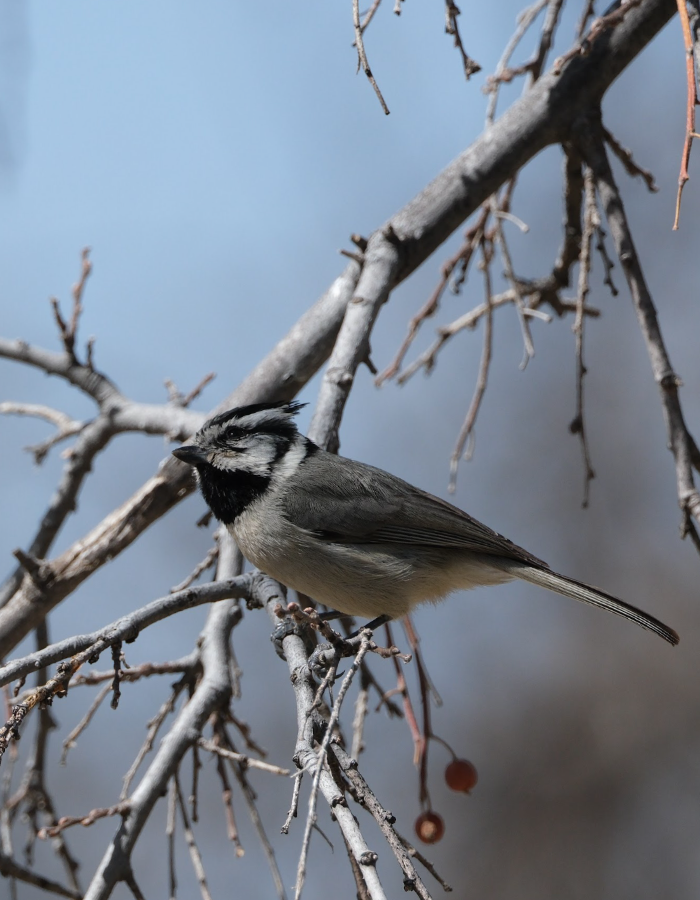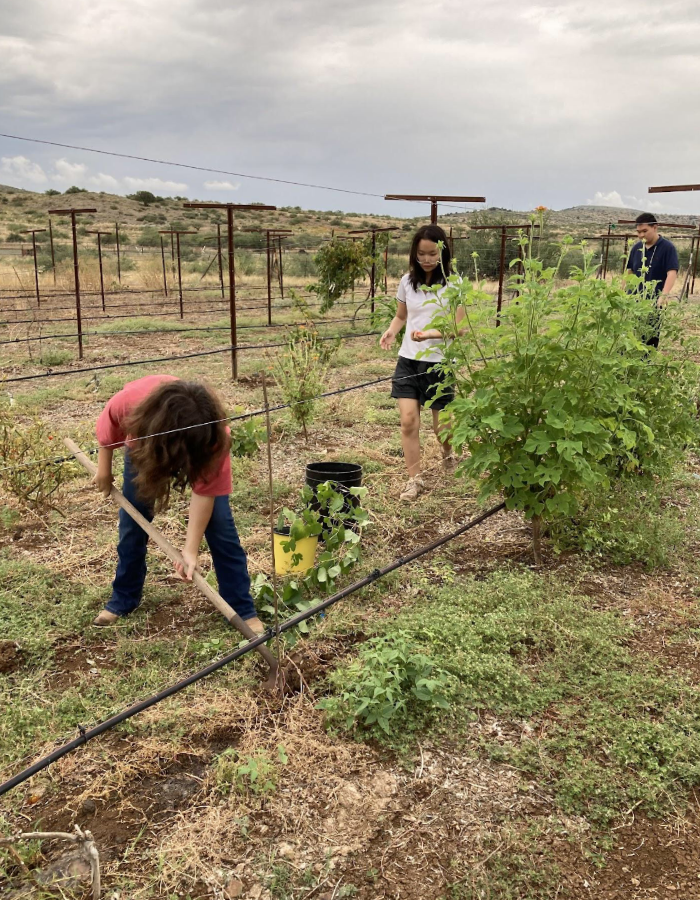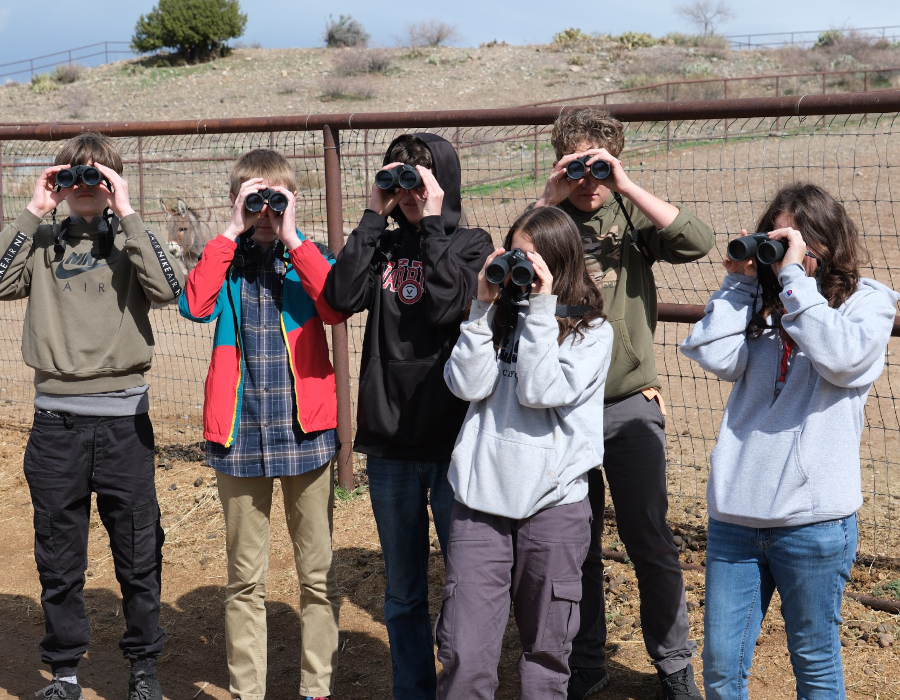An Orme School tradition
“Closeness to wild living things, trees, grasslands, birds and animals, nurtures in those who live in the spacious lands a sense of wonder, a sensitivity to beauty, a reverence for life and creation.” Charlie Orme, 1962

Spring is bursting forth on The Orme School Campus. Our edible campus is full of fruit blossoms and perennials breaking their dormancy and waking up to life once more. As the Say’s Phoebe perches in the morning sun on the branch of a flowering plum tree in the Burpee Orchard, a bridled titmouse flits among the fruit and seeds of the Hackberry trees.
Once you are “up on top” – the area that sits above the main campus and ranch pond – you can see the ridges of the Bradshaw mountains and what we call
“Big Mesa.” The landscape is vast. A golden eagle sits on a rock outcropping above the grazing lands, surveying the semi-desert grasslands below, waiting for air warmed by the sun to lift it above.
Graduation will be here before we know it and soon after, the Southwest willow flycatcher and Western yellow-billed cuckoo will return to their nesting territory on the edges of campus, in the riparian area along Ash Creek. Their familiar sounds will echo through the Burpee Garden Complex all summer long. Summer campers will return to help harvest fruits from the orchard and grapes from the vineyard.
The Orme School is unique in that it has a long standing tradition of outdoor, place-based education on a working ranch with a strong land ethic. Today, we serve a strong and diverse domestic and international student body, but, from the beginning, the Orme family emphasized relationships with the plants, birds and other animals with which they share this land. This was instilled in the students they started instructing in 1929. The Orme School becomes home, and family, for many students, as we are a college preparatory boarding school for students in grades 8-12. Stanley Knowlton, a student from 1934-1937, said, “The Orme Ranch was my real home.”

Billy Cordasco (Orme, 1980) is a fine example of the influence an education at The Orme School can have on a student. He is now President of Babbitt Ranches, managing over 700,000 acres in Northern Arizona. Babbitt Ranches has executed one of the largest conservation easements in the country, developed wildlife conservation projects for species such as the black- footed ferret and the golden eagle, and has diversified in other endeavors including renewable energy.
Still today, amid new challenges, The Orme School teaches this relationship and responsibility to the Earth. The Orme family leads by example and recently entered over 900 acres of private deeded land adjacent to campus into a conservation easement with the Central Arizona Land Trust. Our science department received a grant for the 23-24 school year from the Arizona Game and Fish Department’s K-12 Heritage Program to expand our wildlife education initiatives, including the purchase of a classroom set of binoculars for students’ regular use. Our students participate in Environmental Day at the Arizona State Legislature. The Burpee Garden Complex not only provides educational opportunities for students but also community outreach and education such as an annual fruit tree pruning workshop and garden educator tours, as well as providing fresh food to our dining services and our local food pantry. The chores program that has always
existed at the school, continues as every student helps around the campus and ranch in gardening, horsemanship and general maintenance. Parents of current students are welcome to participate in a community action day in the fall and an Earth Day celebration in the spring.
Other current initiatives include integrating sustainability throughout our curriculum, activities and special events and developing more project based learning. To help meet this goal, all of our faculty are familiar with and utilize the Six Key Competencies in Sustainability (Wiek, Keeler & Redman, 2011). Arizona State University describes these competencies as “complexes of knowledge, skills, and attitudes that enable successful task performance and problem solving related to real-world sustainability problems, challenges, and opportunities.”
The Key Competencies in Sustainability are:
- Systems Thinking
- Futures Thinking
- Values Thinking
- Strategic Thinking
- Interpersonal Competence
- Integrated Problem-Solving
Competency in each of these areas complements basic academic success such as development of effective writing skills and ability to interpret tables and graphs. The result is an individual who is resilient, loves learning, and who is able to comprehend and solve problems on interdisciplinary teams. This is the kind of problem solver the world needs now. This is the type of student The Orme School strives to graduate. These are the messages of today speaking to us from long ago through the values and beliefs the Orme family established for this school from the beginning.

“Let the qualities that characterize [people] who live near the Earth, their resourcefulness, versatility, adaptability, elasticity, democratic attitudes and enthusiasm combine with the discipline, appreciation of cultural values, and respect for the good in history and tradition – those values to be the most often derived from the scholarly world – and re-energize the new [person].” Charles Orme, 1962






